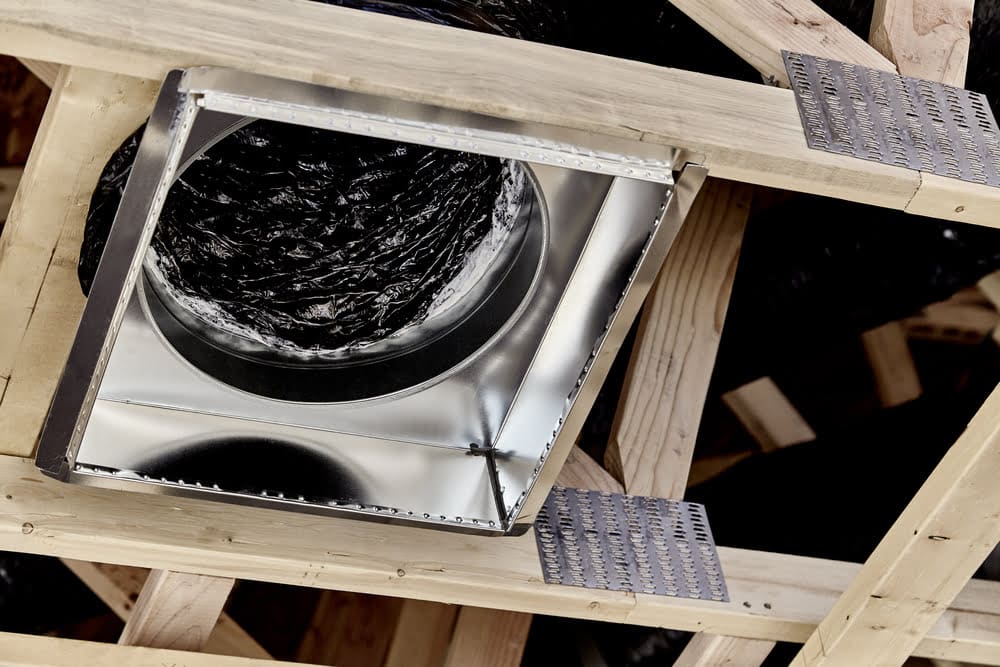Updated: December 18th, 2023
Your attic and basement are extra spaces you can use for everything, from storage space to a spare bedroom. Unfortunately, most AC systems do not cool these areas and temperatures can rise to dangerous levels, rendering the space uninhabitable. Installing air conditioning in in your attic or basement makes them more livable and functional.
But what systems exist for cooling these spaces? Should you connect your central HVAC? We provide you with all these answers and more in this post.
Air Conditioners in Attics
Homeowners are confronted with the decision to either extend their HVAC system to the attic and basement or install new systems in these areas. Usually, the contractor simply extends the ductwork on an existing HVAC system.
However, this method can present several problems. There is a chance that the contractor may not efficiently insulate the ductwork, making your home less energy-efficient and increasing your bills. Besides, it is hard to discover any leakage in the ductwork as you may not visit the areas often. Leakages can also happen due to contraction and expansion of the ducts as these areas experience higher temperature changes than the rest of the house.
Attic Installations Save Labor and Cost Less
A better alternative is to install an attic AC, which helps you avoid the cons of extending your central air conditioning. Attic units are less expensive to buy and install than extending your HVAC. Contractors can leave the ductwork exposed and do a less expensive job, which means it will cost less. Additionally, these units are cheaper to operate in terms of energy, saving you money in the long run.
Attic units are also space savers. The system has two small parts, with one on the outside. Since attics are smaller spaces, installing a stand-alone attic AC unit will save precious square footage.
Why Ventilate the Basement?
Moisture accumulates in the basement until it creates an atmosphere that breeds various pathogens, including mold spores, strong odors, and other pollutants. If you leave the basement unventilated, you might notice a pungent smell and peeling paint, both tell-tale signs of high humidity. By ventilating the basement, you provide constant fresh air that prevents all the abovementioned problems.
Your Basement Ventilation Options
Let’s discuss the two primary methods of ventilating your basement – mechanical ventilation and the ductless mini-split system.
Mechanical Ventilation
Mechanical ventilation uses fans to push air outside. You may install a basement AC unit or a fan inside the window to push the indoor air out, creating an airflow that removes the excess moisture. You may also expand your central air conditioning system to maintain the temperatures in your basement.
Install A Ductless Mini-Split System
A ductless mini air conditioner offers an easy solution when your air conditioner cannot handle the extra load, or you need to manage your energy bills more efficiently. Ductless mini split systems are easy to install as they do not require ductwork and are highly energy efficient, saving energy costs. They are also efficient and can regulate temperatures in the basement with ease.
Heat Pump & Air Conditioner Installation, Replacement, Repair & More in Denver
If you plan to use your attic, consider installing a suitable attic AC unit rather than expanding your central air conditioning system. Likewise, a basement window AC unit offers better energy and cost savings. Ventilating your basement helps keep away pollutants, odors, and mold. We offer a variety of HVAC-related services in the Denver, CO, area. Click here to see more of our services.
At The Weather Changers, we know heating and cooling better than anyone! If you wish to air condition the attic and basement or one of them, contact us or call us at 720-594-3108 for advice and installation work at your Denver home.





